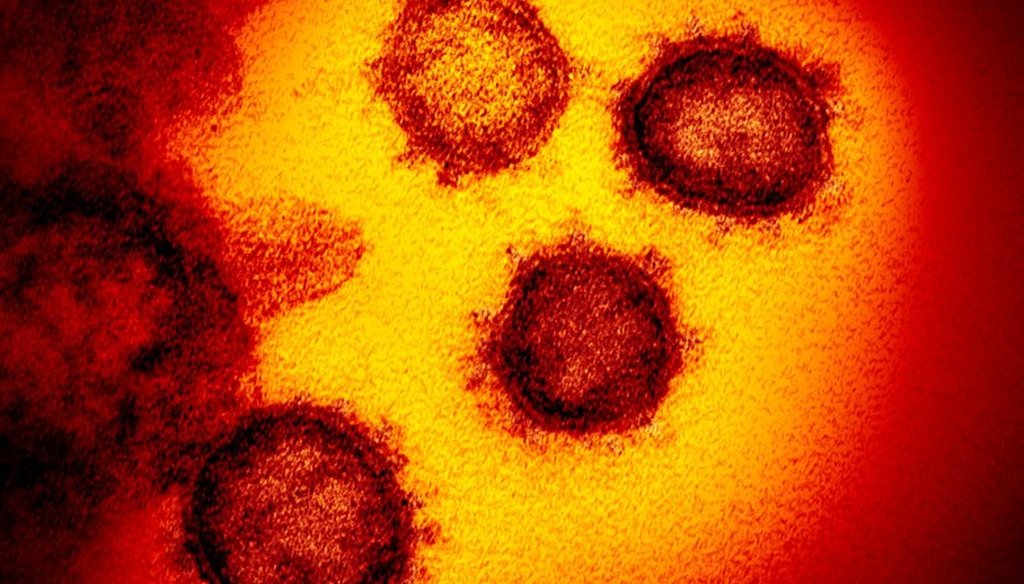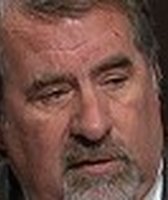Stand up for the facts!
Our only agenda is to publish the truth so you can be an informed participant in democracy.
We need your help.
I would like to contribute

This undated electron microscope image made available by the U.S. National Institutes of Health in February 2020 shows the Novel Coronavirus SARS-CoV-2.
If Your Time is short
- Misinformation continues to spread about the novel coronavirus and the disease it causes, COVID-19.
- Bogus claims focus on its origin along with phony cures.
- Meanwhile, pundits and politicians have either downplayed the risk of the virus or exaggerated the Trump administration’s budget cuts and lack of preparedness.
The novel coronavirus continues to spread across the globe, with new cases now reported in dozens of countries. As it proliferates, so does misinformation about the virus and the disease it causes, COVID-19.
In recent weeks, bogus claims have centered on its origin and phony cures while pundits and politicians have either downplayed the risk of the virus or exaggerated the Trump administration’s budget cuts and lack of preparedness.
As of Feb. 27, the 2019 coronavirus had spread throughout China and to 46 countries outside of China, infecting more than 82,200 people globally, according to the World Health Organization.
The WHO declared the virus an international public health emergency in late January, and the organization’s director-general has since called it a "potential pandemic."
Global health organizations and news outlets including PolitiFact are debunking these false claims and putting out the facts.
Here is a summary of the efforts so far:
‘A Vaccine Against Misinformation’
In January, the World Health Organization launched the WHO Information Network for Epidemics, called EPI-WIN. It’s a pilot program to ensure facts about the virus are communicated to the public. It includes information about how the virus spreads, its symptoms, who is at risk of severe illness, along with advice on how to protect oneself and who should use masks. NPR reported on the program here.
"We need a vaccine against misinformation," said Dr. Mike Ryan, head of WHO's health emergencies program, at a briefing on the virus earlier this month, as reported by NPR.
Fact-checking President Trump’s Comments
At a Feb. 26 press conference, President Trump downplayed the threat posed by the virus despite his own health experts’ stern warnings about the outbreak. PolitiFact National pointed out in a fact-check this week that Trump said the virus might not hit the United States, contradicting a warning from the top official at the Centers for Disease Control and Prevention. The official said the day before that it’s now only a matter of when and how far the virus will spread.
Throughout his press conference, PolitiFact reported, Trump claimed that 15 Americans had contracted the new virus, even though the CDC's total count was then at 60 and is now up to 61.
"We have a total of 15 people, and they’re in a process of recovering with some already having fully recovered," Trump said.
The president seemed to be referring to the 15 people who were diagnosed in the United States. He later called them "the original 15."
But that left out the patients who were repatriated with the virus from abroad, including three people who returned from Wuhan and 43 who fell ill on a cruise ship, according to the CDC.
Democratic Presidential Hopefuls Exaggerate Trump’s Health Budget Cuts
No party has a monopoly on misrepresenting the facts. Democratic presidential candidates Joe Biden and Mike Bloomberg both distorted the truth, according to an Associated Press fact check, when they said the Trump administration had defunded the Centers for Disease Control and Prevention while speaking at a debate in South Carolina.
Trump’s budgets have proposed cuts to public health, only to be overruled by Congress, where there’s strong bipartisan support for agencies such as the CDC and National Institutes of Health. Instead, financing has increased, the AP reported.
Also this week, PolitiFact rated Half True a similar claim Bloomberg made in a CNN town hall before the South Carolina debate. The former New York mayor said Trump is hampered in the fight against coronavirus because "No. 1, he fired the pandemic team two years ago. No. 2, he's been defunding Centers for Disease Control."
PolitFact found "fired" might be a little strong. In 2018, however, it found top national security officials handling pandemics left their jobs abruptly and were not replaced by the Trump administration. On funding, there’s no question, PolitiFact added, that the Trump administration sought to cut key CDC budget categories. But that funding was restored by Congress and later increased through bills Trump ultimately signed.
Hoaxes On The Origin And Cures For Coronavirus
PolitiFact has debunked numerous false claims about how the virus started or what could cure it. One of the most outlandish assertions says China stole the coronavirus from Canada and weaponized it into a bioweapon. PolitiFact rated that false and found it comes from a blog with a track record of publishing bad information.
The national fact-checking website also knocked down false claims in Facebook posts that the coronavirus isn’t new because "Lysol has it listed as one of the viruses that it kills."
PolitiFact reported there are seven kinds of coronaviruses that can infect humans and some of the viruses are common. The current outbreak spreading from Wuhan, China, is caused by a previously unidentified strain known as the 2019 novel coronavirus. Cleaning products that list coronavirus on their labels are not referring to this strain.
On bogus claims about cures, PolitiFact reported: No, drinking bleach will not ward off the coronavirus, nor will cocaine or marijuana.
Lastly, there’s even misinformation about the coronavirus and whether people need to shave their beards. A 2017 CDC infographic included in recent news articles shows how facial hair could interfere with respirator masks. But PolitiFact found that the graphic is unrelated to coronavirus protection and the CDC has not recommended people shave their beards to ward off the virus.
On the topic of masks, NPR reported that some infectious disease experts are hesitant to suggest that people wear masks as a preventive measure because they can provide a false sense of security.
What they do agree on is that wearing a mask is a good idea if you are sick, so you can reduce the chances that you'll infect others.
Is there a claim about the coronavirus you want us to check out? Send us a request through our Ask PolitiFact California form. We’ll consider it in future updates.
RELATED:
CapRadio’s guide: What You Need To Know About Coronavirus In California
PolitiFact’s reader’s guide to misinformation about the coronavirus
Our Sources
World Health Organization, COVID-19 FAQs, Feb. 28, 2020
Associated Press, AP FACT CHECK: Democrats distort coronavirus readiness, Feb. 26, 2020
NPR, Fake Facts Are Flying About Coronavirus. Now There's A Plan To Debunk Them, Feb. 21, 2020
NBC, Fact checking Trump's comments on coronavirus, Feb. 26, 2020
PolitiFact, PolitiFact’s coronavirus coverage in one place, Feb. 10, 2020
PolitiFact, Did Donald Trump fire pandemic officials, defund CDC?, Feb. 28, 2020


















































